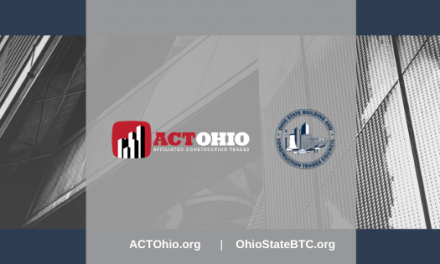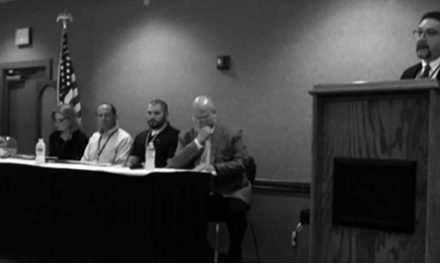Lagging projects, “zero” savings result from prevailing wage repeal in Ohio’s neighboring state.

West Virginian Building Trades workers rally against prevailing repeal, March 2015. (Credit: WV Building Trades Facebook).
Students at Chapmanville Intermediate School in Logan County, West Virginia, began their 2018 school year in old, reopened facilities thanks to construction delays at their brand-new school according to the Williamson Daily News. The Chapmanville Intermediate project was among the first school construction jobs bid following the repeal of West Virginia’s prevailing wage law, according to West Virginia’s Affiliated Construction Trades.
The organization’s Sept. 2018 ACT Report newsletter shines a spotlight on the Chapmanville School project and other false savings claims made by the groups who lobbied to repeal West Virginia’s prevailing wage law in 2015.
The prevailing wage repeal, which took effect in May 2016, eliminated prevailing wage requirements on new public construction projects like the Chapmanville Intermediate School.
“County officials, struggling to get the project on schedule, required the contractor to develop a plan to meet the opening date. But the plan failed,” according to the ACT Report. The project has also been plagued by quality problems and OSHA citations, including initial fines of more than $20,000 for at least two contractors.
By July, Logan County Board of Education President Paul Hardesty had been expressing concern “for months over the lack of properly completed construction…(and) said the current punch list that remains ‘could take as long as six months,’” according to the Williamson Daily News.
The extensive punch lists and delays mean the project’s “low bid may turn out to be very expensive for taxpayers when all is said and done,” Dave Efaw, Secretary-Treasurer of the WV Building Trades, told the ACT Report.
Efaw’s concerns were echoed by ACT West Virginia Director Steve White. “We see poor quality construction, significant delays, cost overruns, low wages, the elimination of safety benefits, (and) safety citations. All of which we believe (are) attributed to the repeal of prevailing wage.”
White told the ACT Report that a questionable study commissioned by repeal proponents which promised taxpayers up to 7% savings “used wrong numbers and therefore got misleading results.”
“We have tracked every project since the prevailing wage law has been repealed and can say with certainty that there has been zero savings to taxpayers as a result,” said White.
To read economic analyses and learn more about the impact prevailing wage repeal has had on West Virginia Building Trades workers, visit WVBrokenPromise.com.
Follow this link to learn more about prevailing wage in Ohio.





